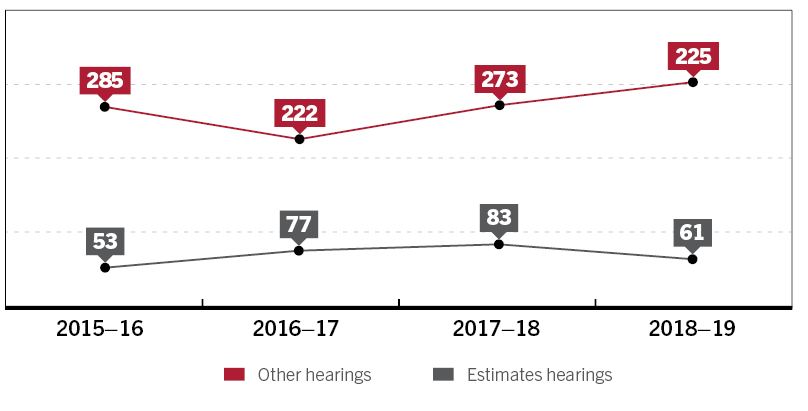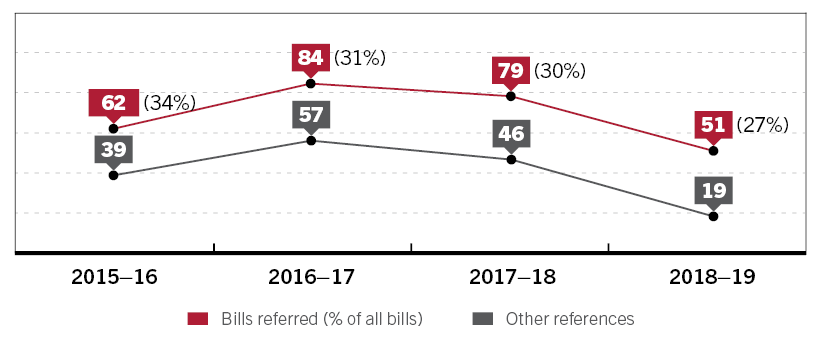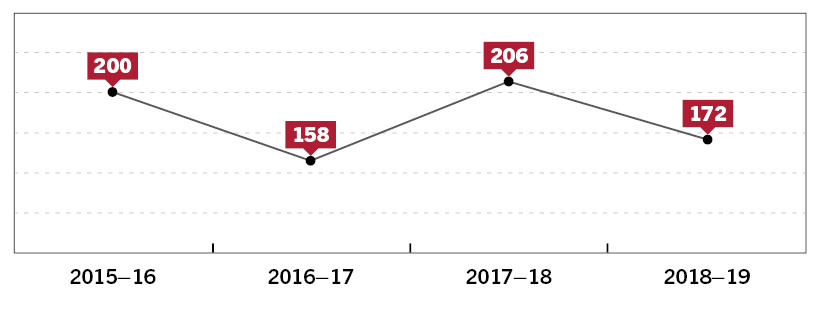| Outputs |
| Secretariat support and procedural advice to the legislative and general purpose standing committees, select committees, and certain joint committees. |
| The degree of satisfaction of the chairs of Committees, committee members and other senators with the quality and timeliness of advice and support. |
Formal and informal feedback, including reference to committee reports during debates in the Senate, shows that senators consider the support provided by the Committee Office to be effective. |
| Draft reports, reports and other documents are timely, accurate and of a high standard. Tabling deadlines are met. |
Accurate advice, documentation, and draft reports were provided to committees in accordance with their requirements.
Reports were drafted and presented to the Senate in accordance with the timeframes agreed by committees and deadlines set by the Senate.
|
| Inquiry information, evidence and reports are published promptly upon authorisation. |
Information was updated promptly and accurately on committee web pages. Submissions, other documents and reports were published consistent with the decisions of committees. |
| Inquiries from the public regarding committees are handled promptly and professionally. |
Telephone and email queries from the public were responded to promptly and accurately.
Members of the public had ready access to the material they requested regarding committee activities or procedures.
|
Overview
Committee Office secretariats supported the eight legislative and general purpose standing committees, seven select committees, five joint committees and one joint select committee (see figure 11). As in the previous year, committees continued to experience a significant workload, with high numbers of inquiries and hearings, tapering as the 2019 election approached. The cost of the office in 2018–19 was $10.1m ($11.1 in 2017–18), with staff salaries comprising approximately 81 per cent of the office’s total expenses.
The remaining costs continued to be administrative (for example, transport and accommodation for secretariat staff attending hearings, printing and venue hire). These administrative costs continue to be high due to the high numbers of interstate committee hearings.
Committee secretariats provided administrative support to committees, including processing submissions, publishing material to committee websites and arranging hearings around Australia. Staff also analysed the evidence committees received, drafted briefing material and reports, arranged for the tabling and publication of reports, and assisted witnesses and others to participate in inquiries. Finally, secretariats provided advice to chairs and committee members, including in relation to matters which raised complex procedural issues.
The significant workload of committees in the first half of the reporting period brought the familiar workload pressures on secretariats and senators, requiring discussions about which inquiries to prioritise and the need for extensions. This moderated in the second half of the reporting period in preparation for the 2019 federal election.
Again, comments made in the Senate when committee reports are tabled or debated indicated high levels of satisfaction with the quality of the advice and support provided by secretariats.
Figure 11 – Elements and responsibilities of the Committee Office
| Executive |
Tim Bryant, Clerk Assistant
David Sullivan, Senior Clerk of Committees
|
|
Procedural advice and training.
Planning and coordination.
Secretariat staffing and resources.
Statistics and records.
|
|
Community Affairs
Jeanette Radcliffe
Economics
Mark Fitt
Education and Employment
Stephen Palethorpe
Environment and Communications
Christine McDonald
Finance and Public Administration
Ann Palmer
Foreign Affairs, Defence and Trade
Lyn Beverley
Legal and Constitutional Affairs
Sean Turner
Rural and Regional Affairs and Transport
Jane Thomson
Additional Support Unit
Bonnie Allan
|
Joint statutory
Australian Commission for Law Enforcement Integrity
Sophie Dunstone
Corporations and Financial Services
Patrick Hodder
Law Enforcement
Sophie Dunstone
Joint standing
National Broadband Network
Ann Palmer
National Disability Insurance Scheme
Gerry McInally
Joint select
Oversight of the implementation of redress related recommendations of the Royal Commission into Institutional Responses to Child Sexual Abuse
Sean Turner
|
Charity Fundraising in the 21st Century
Bonnie Allan
Electric Vehicles
Ann Palmer
Future of Work and Workers
Stephen Palethorpe
Obesity Epidemic in Australia
Gerry McInally
Red Tape
Gerry McInally
Stillbirth Research and Education
Sophie Dunstone
Fair Dinkum Power
Ann Palmer
|
Activity levels and workload
The workload of the committees supported by the Committee Office is determined by decisions of the Senate and of the committees themselves. During this reporting period, the Committee Office again faced a significant workload in terms of the number of committees and inquiries supported, although the level of committee activity tapered as the 2019 election approached. The highest number of inquiries managed at one time was 66 in August 2018.
Submissions, public hearings and witnesses
The continuing significant workload of committee secretariats during the first half of 2018–19 is evident in the administrative support provided to committees in relation to the processes committees use to collect evidence. This included processing 5,400 submissions. This figure does not include the more than 9,000 emails and form letters linked to various campaigns such as those received in the course of the inquiry into the Sex Discrimination Amendment (Removing Discrimination Against Students) Bill 2018. In addition, secretariats arranged 286 public hearings (including 61 estimates hearings) at which 5,952 witnesses appeared (including 2,641 witnesses at estimates hearings). Secretariats also supported committees by arranging 522 private meetings and 11 site inspections.
Figure 12 – Number of committee hearings, 2015–16 to 2018–19

Again, to manage this volume of work, the office continued to operate in a highly flexible manner with staff regularly working across committees in order to deal with peaks in workload.
Estimates hearings
Supplementary (October 2018) and additional (February 2019) estimates hearings proceeded generally as scheduled. However, the Budget estimates hearings were unusual in that they commenced on the Thursday of a sitting week, partly in anticipation of the calling of the 2019 election. The hearings were truncated when the election was called in the following week. The 61 hearings that were held in 2018–19 continue the trend of high numbers of hearings since the 2014–15 changes to standing orders permitted the holding of extra estimates hearings.
References and reports
In addition to a considerable number of legislation inquiries, committees inquired into and reported on a diverse array of topics including support for Australia’s thalidomide survivors, the United Nations Sustainable Development Goals, electric vehicles, and allegations of political interference in the Australian Broadcasting Corporation.
Figure 13 – Number of references to committees, 2015–16 to 2018–192

The office supported committees to table a total of 172 reports. Figure 14 indicates clearly how the election cycle influences the workload of Senate committees. The two low points in the graph coincide with election years.
Figure 14 – Reports presented by all committees supported by the Committee Office 2015–16 to 2018–19

The quality of reports remains inherently difficult to measure as each report, while initially drafted by Committee Office staff is, in the end, a committee document which reflects the views of senators undertaking the inquiry. Nevertheless, feedback from senators and some participants in inquiries suggests that, despite the pressure created by the volume and short time frame of many inquiries, the high quality of committee reports continues to be maintained. This was achieved through the dedication and expertise of secretariat staff, on occasion supplemented by staff from other areas of the department providing research and drafting assistance.
Activities following the prorogation of the 45th Parliament
The prorogation of Parliament afforded the Committee Office an opportunity to finalise work from the 45th Parliament and prepare for the 46th. These activities included extensive training drawing on the lessons learned from the 45th Parliament, updating manuals, checklists and guidelines, and seeking opportunities for staff development via secondment to other departments and parliaments. The prorogation also provided an opportunity to move interested staff to different secretariats so as to have a new set of professional challenges in the new parliament.
Public information
The provision of information to the public about the work of Senate committees is an area of ongoing focus for the Committee Office.
The office continued to work with the Senate Public Information Office on projects to improve systems for writing reports and managing the high volume of answers to questions on notice provided to committees during estimates. Live Estimates, an online platform for providing live updates about Senate estimates hearings, was fully implemented.
Committee Office staff also supported the department’s seminar program by delivering training sessions to public servants and other members of the public about the operation of Senate committees.
International engagement
Committee Office staff acted as presenters for international delegations visiting Australia. The usual pattern of committee secretaries supporting parliamentary delegations was temporarily paused in anticipation of the 2019 election.
Management and leadership
Under standing order 25(10) a Chairs’ Committee, comprising the chairs of standing committees and Senate select committees, may be convened by the Deputy President to discuss any matter relating to their operations. The Clerk Assistant (Committees) is the secretary. During 2018–19, this committee met to consider issues related to the operations of committees including levels of committee activity and satisfaction of senators with committee support processes.
Committee secretaries also met regularly throughout the year to discuss administrative issues and procedural matters.
Performance outlook
The 2018–19 reporting period again saw the Committee Office support a large number of inquiries, tapering slightly as the 2019 election approached. Similar levels of activity are expected in 2019–20.